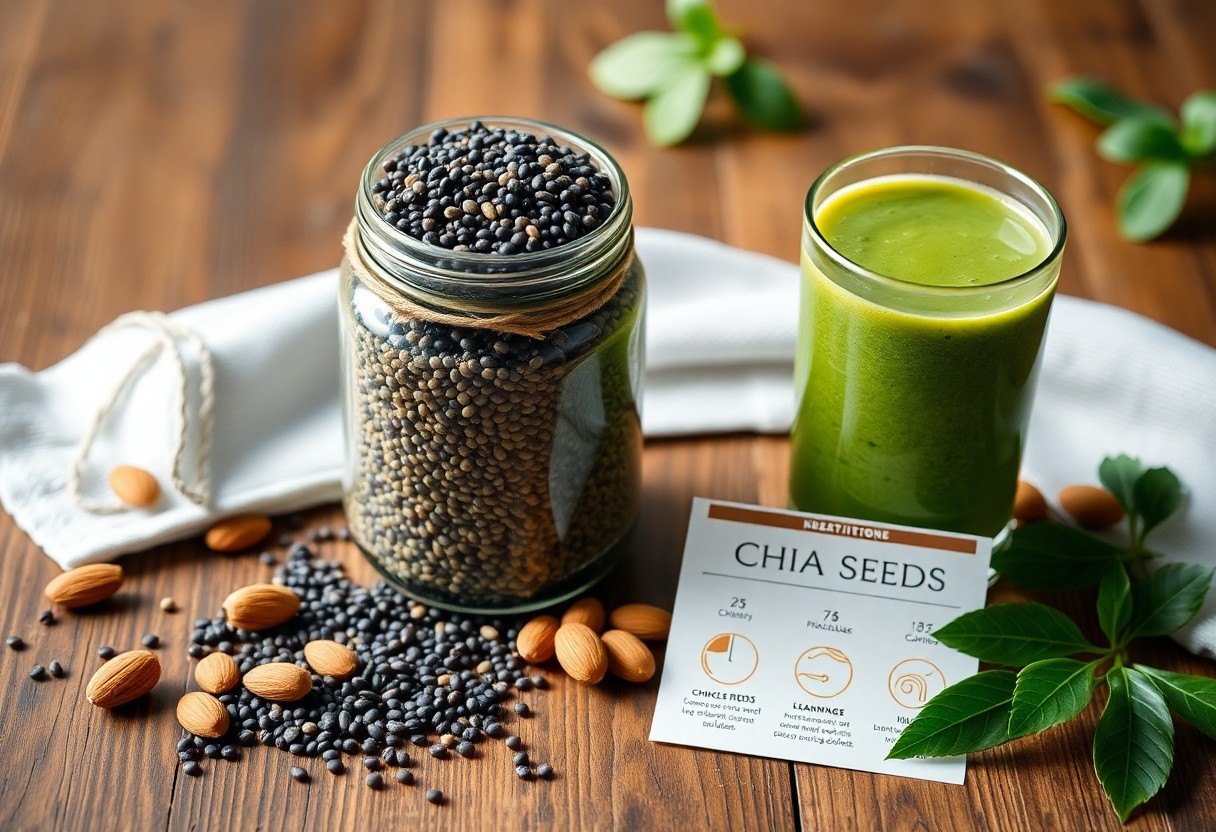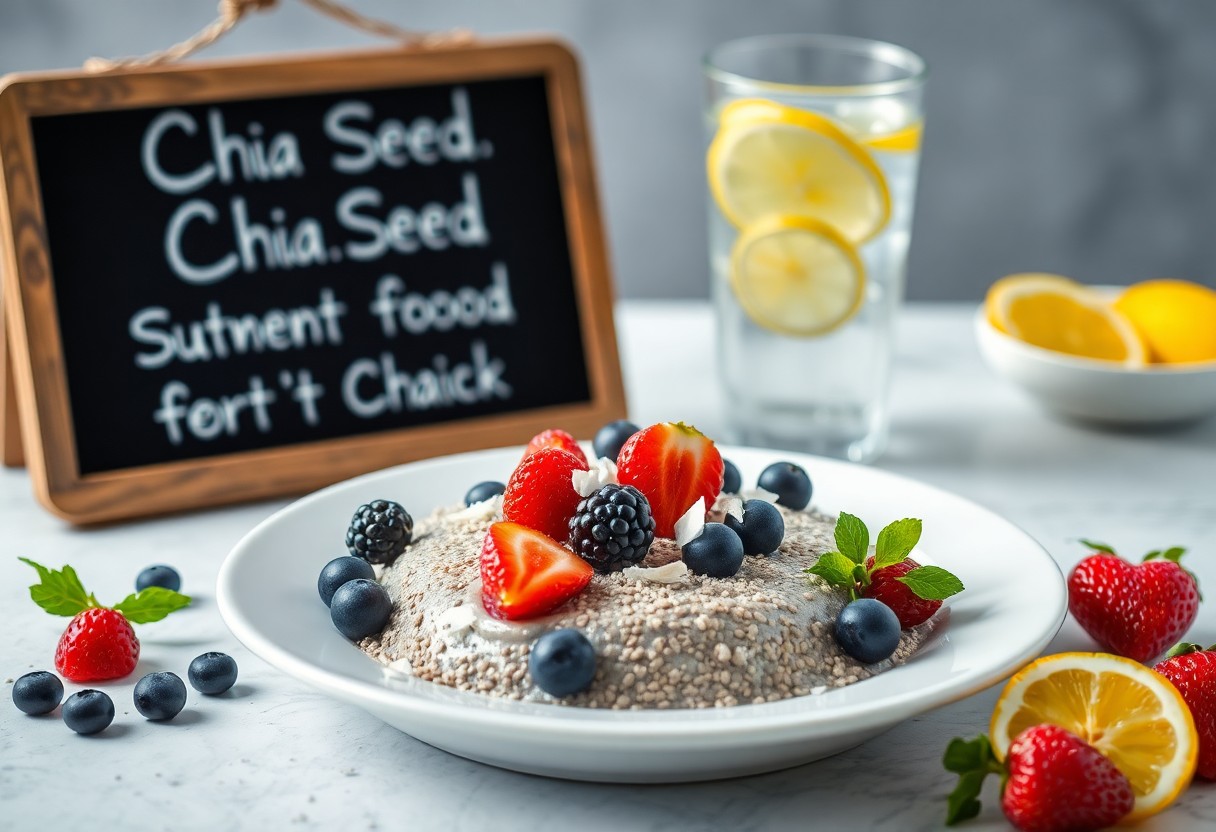You may be surprised to learn that chia seeds are packed with nutrients that can support your weight control efforts. These tiny seeds are rich in fiber, protein, and healthy fats, making them a powerful addition to your diet. Not only do they help keep you feeling full and satisfied, but their nutritional profile contributes to overall health, making them a go-to choice for anyone looking to manage their weight effectively. Discover how incorporating chia seeds into your meals can benefit your wellness journey.

Chia Seeds: Nutrient Powerhouses
Chia seeds stand out as a nutritional powerhouse, packed with crucial nutrients that benefit your overall health. Their high fiber content promotes satiety, aiding in weight control. Each serving of chia seeds delivers a bounty of omega-3 fatty acids, protein, and various micronutrients, making them a popular choice among health enthusiasts and dieters alike.
Unpacking the Nutritional Profile
A single ounce (28 grams) of chia seeds contains 138 calories, 4 grams of protein, 9 grams of fat, 12 grams of carbohydrates, and a staggering 11 grams of fiber. This unique combination supports digestive health and facilitates weight management while providing you with a steady source of energy throughout the day.
Essential Vitamins, Minerals, and Antioxidants
Chia seeds are rich in vitamins and minerals, including calcium, magnesium, phosphorus, and manganese, which are vital for bone health and metabolic functions. They also contain antioxidants like quercetin, chlorogenic acid, and caffeic acid, helping combat oxidative stress and inflammation in your body.
The abundance of vitamins and minerals in chia seeds plays a significant role in promoting your daily health and wellness. For instance, the calcium content in just one serving provides about 18% of your daily requirement, supporting strong bones and teeth. Magnesium is also notable; further aiding muscle function and energy production. Additionally, antioxidants help protect your cells against damage from free radicals, potentially lowering your risk of chronic diseases and boosting your immune system. Integrating chia seeds into your diet ensures you benefit from these crucial nutrients while enjoying their versatility in various dishes.
The Fiber Factor: How Chia Seeds Aid Digestion and Satiety
Chia seeds are an exceptional source of dietary fiber, providing about 11 grams per ounce. This fiber content not only supports smooth digestion but also enhances feelings of fullness, making these tiny seeds an effective ally in weight control. The gel-like substance chia seeds form when soaked in liquid slows digestion, helping you feel satisfied longer and ultimately reducing the urge to snack between meals.
The Role of Dietary Fiber in Weight Management
Fiber plays a pivotal role in weight management by promoting satiety and reducing overall calorie intake. High-fiber foods take longer to digest, keeping you feeling full and satisfied for extended periods. This can prevent overeating and encourage healthier food choices, making fiber-rich options like chia seeds vital for those seeking to manage their weight effectively.
How Chia Seeds Promote Feelings of Fullness
The unique ability of chia seeds to absorb liquid and swell in your stomach enhances feelings of fullness. This expansion not only takes up space in your digestive system but also prolongs the satisfaction you experience after eating. As they swell, they slow absorption rates, providing a steady release of energy, which helps thwart cravings and encourages timely meal intervals.
This expansion occurs due to chia seeds' hydrophilic nature, absorbing up to 12 times their weight in water. When you consume chia seeds, especially in a soaked state, they trap water and create a thicker consistency in your stomach. This gastric fullness can significantly delay hunger signals, making it easier to adhere to portion control. The sustained energy release from the fiber also minimizes the spikes in blood sugar, further supporting your weight management goals.
Omega-3 Fatty Acids: Nature’s Secret Weapon for Weight Control
Omega-3 fatty acids play a pivotal role in weight management by promoting fat oxidation and reducing inflammation. You benefit from their ability to improve insulin sensitivity, which helps in regulating blood sugar levels. This unique fatty acid not only supports heart health but also aids in appetite regulation, making it easier to control cravings and maintain a healthy weight.
Importance of Omega-3s for Metabolism
Incorporating omega-3s into your diet can significantly enhance your metabolic rate. These fatty acids contribute to reducing lipid levels in the blood, which can improve your overall energy balance. Effectively, omega-3s help your body burn fat more efficiently, leading to more effective weight management strategies.
Chia Seeds vs. Other Sources of Omega-3s
Chia seeds offer an impressive plant-based source of omega-3 fatty acids, especially alpha-linolenic acid (ALA). Unlike fish sources, chia seeds provide omega-3s without the risk of contaminants like mercury. They also come with added fiber and antioxidants, making them a superior choice for those seeking a healthy omega-3 boost through a vegetarian or vegan diet.
Chia seeds contain about 5 grams of omega-3s per ounce, rivaling that of salmon, which has approximately 1.5 grams per ounce. This makes chia seeds an exceptional source for individuals who do not consume fish or prefer plant-based options. The unique gel-like texture of soaked chia seeds not only enhances digestion but also contributes to longer-lasting satiety, helping you better manage your hunger throughout the day. Additionally, many other omega-3 sources, like flaxseeds and walnuts, lack the same fiber content, which is vital for digestive health and further aids in weight control.

Chia Seeds and Blood Sugar Regulation
Chia seeds can significantly impact blood sugar regulation, supporting your overall health and weight management efforts. Their high fiber content helps slow down digestion, ensuring a gradual release of glucose into the bloodstream. This prevents the sharp spikes and dips often associated with consuming high-glycemic foods, ultimately leading to more stable energy levels and decreased cravings for unhealthy snacks.
The Connection Between Blood Sugar and Weight
Stable blood sugar levels are imperative for weight control as they influence hunger and energy balance. When blood sugar fluctuates, it can lead to increased cravings and overeating, making it challenging to maintain a healthy weight. By keeping your blood sugar levels steady, you can enhance your ability to manage your appetite and make better food choices.
How Chia Seeds Help Maintain Steady Energy Levels
Chia seeds contribute to steady energy levels through their unique combination of fiber, protein, and healthy fats. This powerful trio slows down digestion, allowing your body to release energy gradually rather than experiencing rapid fluctuations. As a result, you avoid energy crashes that can leave you feeling fatigued and prone to unhealthy snacking.
Consuming chia seeds can promote a steady state of energy by enhancing satiety and reducing hunger pangs. For instance, the soluble fiber in chia seeds absorbs water, forming a gel-like substance that expands in your stomach, leading to prolonged feelings of fullness. This not only stabilizes your energy throughout the day but also helps you resist the temptation to graze on high-calorie foods. With a steady energy supply, you're more likely to stay active and engaged in physical activities, further supporting your weight control efforts.
Practical Ways to Incorporate Chia Seeds into Your Diet
Chia seeds are versatile and can easily enhance your meals. Add them to smoothies for an added fiber boost or sprinkle them on salads for a delightful crunch. They also work well in oatmeal or yogurt, absorbing liquid and creating a satisfying texture. Consider using them in baked goods, such as muffins or pancakes, to enrich their nutritional profile. You can even create chia pudding by mixing the seeds with milk or a dairy alternative and letting them soak overnight, resulting in a creamy, nutritious treat.
Creative Recipes Featuring Chia Seeds
Experiment with chia seeds through various recipes that highlight their unique texture and nutritional benefits. Try a refreshing chia seed lemonade by mixing water, lemon juice, and honey with soaked chia seeds for a hydrating drink. You can also bake chia seed energy bars using dates, nuts, and coconut for a wholesome snack. For a dessert option, blend chia seeds into your favorite smoothie bowl, topping it off with fruits and nuts to create a visually appealing, nutrient-dense dish.
Tips for Maximizing Their Nutritional Benefits
To fully capitalize on the health benefits of chia seeds, consider soaking them before consumption. This process enhances nutrient absorption and improves hydration. Additionally, pair chia seeds with healthy fats, such as avocado or nut butter, to promote better nutrient utilization in your body. Incorporating a variety of foods alongside chia seeds can also create a balanced diet, ensuring you receive a wide array of nutrients. Recognizing the significance of moderation is key; aim for 1-2 tablespoons daily to reap the benefits without overindulging.
- Soak chia seeds in water or juice for at least 20 minutes before eating.
- Combine chia seeds with healthy fats for better absorption.
- Use chia seeds in conjunction with a range of other nutrient-rich foods.
- Incorporate them into your meals gradually to avoid digestive discomfort.
- Recognizing the importance of portion control can help you maximize their benefits.
Soaked chia seeds not only enhance digestibility but also provide a gel-like consistency that can enrich your dishes. By pairing them with antioxidants from fruits, or protein-rich foods like Greek yogurt, you increase their nutritional profile. Adapting your meals to include chia seeds will also ensure you are receiving the health benefits they offer, from improved digestion to sustained energy levels throughout the day. Recognizing how these seeds complement your diet can lead to healthier eating patterns.
- Explore various soaking liquids, including coconut milk or almond milk, for different flavors.
- Experiment with adding chia seeds to soups or sauces for thickening.
- Mix them into homemade granola or trail mix for a nutritious snack.
- Utilize chia seeds as an egg substitute in vegan baking.
- Recognizing the versatility of chia seeds can help integrate them seamlessly into your meals.
To wrap up
As a reminder, chia seeds are packed with imperative nutrients, including fiber, protein, and omega-3 fatty acids, making them an excellent choice for your weight control efforts. Their high fiber content helps you feel full longer, aiding in appetite regulation. Additionally, the healthy fats in chia seeds support metabolic health. Incorporating these superfoods into your diet can enhance your overall well-being while assisting you in maintaining a balanced weight. By choosing chia seeds, you empower your body with the nutrients it needs for effective weight management.
FAQ
Q: What are the key nutritional components of chia seeds?
A: Chia seeds are rich in omega-3 fatty acids, protein, dietary fiber, vitamins (especially B vitamins), and minerals such as calcium, magnesium, and phosphorus. They contain antioxidants that help reduce inflammation and promote overall health.
Q: How do chia seeds aid in weight management?
A: Chia seeds can absorb several times their weight in water, forming a gel-like substance. This helps to promote a feeling of fullness, reduces appetite, and can result in lower calorie intake throughout the day, aiding in weight control.
Q: Can chia seeds improve digestive health?
A: Yes, the high fiber content in chia seeds aids digestion by promoting regular bowel movements and maintaining gut health. The soluble fiber also supports the growth of beneficial gut bacteria.
Q: Are there any specific health benefits associated with the antioxidants found in chia seeds?
A: The antioxidants in chia seeds help combat oxidative stress, reduce inflammation, and lower the risk of chronic diseases, including heart disease and type 2 diabetes, which can be beneficial for overall health and weight management.
Q: How can chia seeds be incorporated into a daily diet?
A: Chia seeds can be sprinkled on salads, blended into smoothies, added to yogurt, or used in baking. They can also be soaked in water or milk to create chia pudding, making them versatile for various meals and snacks.

0 Comments